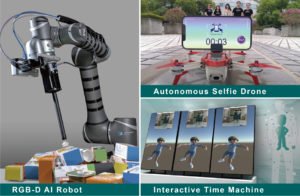The Taiwanese leading high-tech applied research institution, The Industrial Technology Research Institute (ITRI), recently debuted AI, robotics, and ICT technologies at CES 2022, as well as on
ITRI unveiled the RGB-D AI Robot, the world’s first collaborative robot with built-in 3D vision, which was granted a CES 2022 Innovation Award. Its sensing technology, mounted on a robotic arm, is 168 times smaller than those used by comparable robots and 38.6 times faster. The smart 3D vision sensing technology offers automatic three-dimensional scanning of the object area and helps the arm to determine the optimal angle at which to lift objects according to their shape and placement. The RGB-D AI Robot can be used to sort and package objects for smart automation in the manufacturing and logistics industries, as well as to serve customers directly in retail or service businesses and healthcare.
The RGB-D AI Robot also makes use of self-learning technology to allow for fast, high-precision 3D object retrieval, removing the need for revising control programs to teach robots to identify objects, a process typically taking one to two weeks. The RGD-D AI Robot is able to adapt to changes in the production line, quickly learning the best handling strategy in less than 12 hours. As the robotic arm becomes smarter, it can achieve auto-learning and determine the pick-up or suction point for any new object, both reducing engineering costs and increasing efficiency. The RGB-D AI Robot is expected to reach the market by March 2022.
The event also saw the introduction of the Autonomous Selfie Drone, which handles all of the composition, angle, and lighting preparations before flying itself to take the best selfie picture, determined via AI algorithms and data acquired from essential photography techniques. Users are also able to set up different close-up angles, photography body ratio, and compositions. The drone is able to analyze posture and head orientation to automatically adjust its own position and the angle of depression to achieve the optimal composition. Its relative portrait mode uses smart framing technology to analyze the user and background, creating a natural and unobtrusive match between the subject and the surroundings. ITRI’s drone sets itself apart with fully automated photography, smart aesthetic composition, and the direct use of the phone camera, granting superior resolution and eliminating the need to convert image formats.







